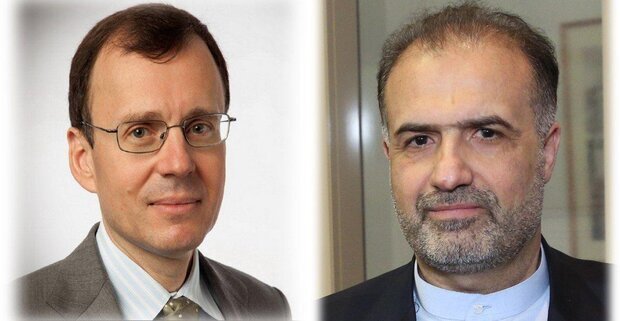Iran, Russia underscore nuclear co-op amid U.S. pressure

TEHRAN – Iranian Ambassador to Moscow Kazem Jalali and Deputy Head of Russia's Rosatom Company for International Affairs Nikolai Spassky have met to discuss Iran-Russia nuclear cooperation in the face of U.S. pressure.
During the meeting, the two sides discussed the developments in bilateral cooperation in the field of peaceful nuclear activities and the obstacles faced by Iran and Russia, Mehr reported on Saturday.
Jalali and Spassky emphasized the need to continue bilateral collaboration in the face of U.S. attempts to destroy the Iran nuclear agreement, officially called the Joint Comprehensive Plan of Action (JCPOA).
The JCPOA was struck between Iran and six world powers, including the U.S., China, Russia, France, Britain and Germany in 2015. After the deal was signed, Iran and Russia started to build the second and third blocks of the Bushehr nuclear power plant.
In 2018, the U.S. unilaterally pulled out of the deal and pursued a policy of “maximum pressure” against Iran to force it to negotiate a new deal.
Russia and China have strongly opposed Washington’s anti-Iran measures, which included targeting top Iranian officials with sanctions and assassinating Iran’s top anti-terror general Qassem Soleimani.
Since the U.S. quit the nuclear deal and imposed sanctions on Iran, the three European countries to the pact have failed to fulfill their commitments to the agreement.
The participant states of the Joint Commission of the Joint Comprehensive Plan of Action (JCPOA) gathered in Vienna on Tuesday to address Iran’s complaint and also discuss Washington’s latest move to invoke the UN sanctions snapback against Iran.
In a statement, they asserted that the U.S. cannot invoke the UN sanctions snapback against Iran, emphasizing that full implementation of the agreement by all sides remains crucial.
U.S. Secretary of State Mike Pompeo has announced that all UN sanctions against Iran will be reinstated on September 20 after the U.S. “activated the snapback mechanism”.
However, the claim was strongly denounced by other signatories of the nuclear deal including Iran, the EU, Russia and China.
MH/PA
Leave a Comment